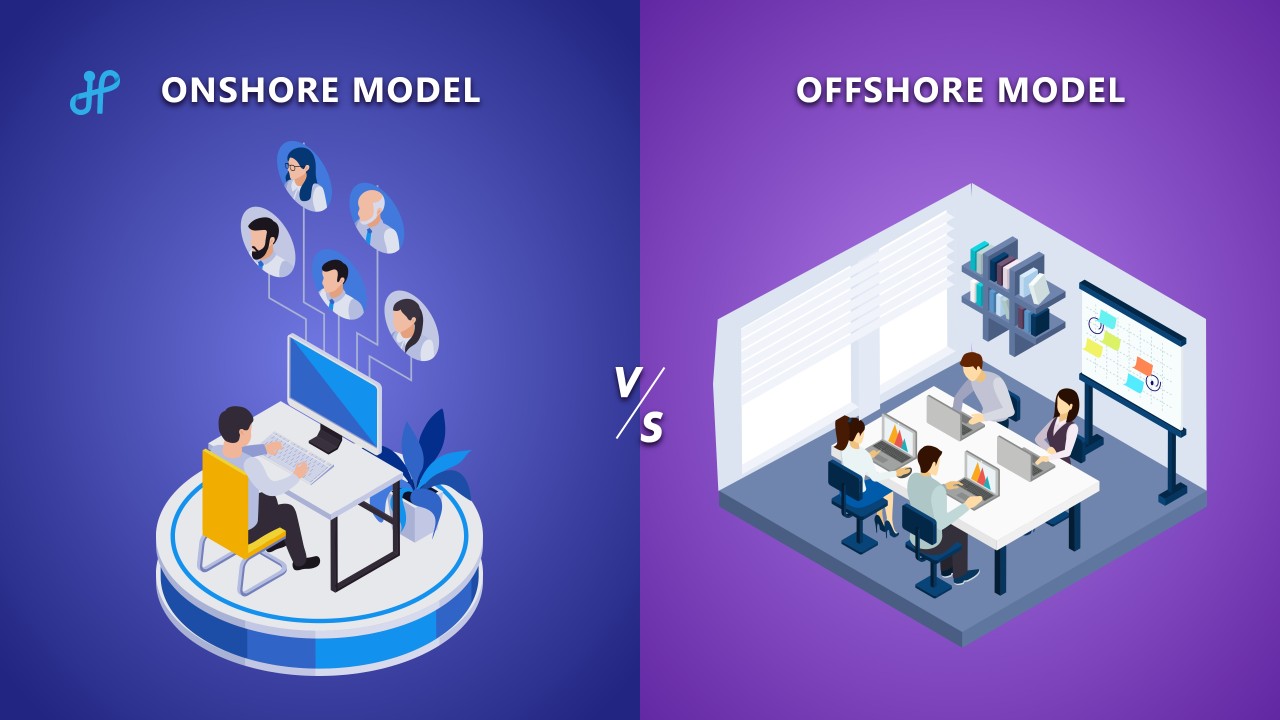Onshore vs. Offshore operations understanding is pivotal in the realm of business expansion. This choice can significantly impact your business’s growth and success. To make this decision effectively, you must consider several critical factors, including cost efficiency, talent availability, and market knowledge. And we, OnextDigital, are here to aid you with that.
Understanding Onshore and Offshore Operations
Before delving into the differences between onshore and offshore operations, it’s essential to understand the fundamental concepts.
Onshore Operations
Onshoring involves outsourcing business processes to companies within the same country. This approach allows you to keep your business operations domestic while still benefiting from external expertise. For example, a New York-based business may outsource its software development to an onshore agency in San Francisco, leveraging local talent and resources.
Offshore Operations
Offshoring, on the other hand, refers to conducting business activities outside your country. Companies choose offshoring to access tax advantages and cost savings available in other countries. Vietnam, renowned for software development outsourcing, is an attractive choice. An American company may choose to offshore its software development, benefiting from global resources and expertise.
Comparing Onshore Vs. Offshore Services
Both onshore and offshore services have distinct advantages and considerations. Let’s explore these differences in detail.
1. Onshore Vs. Offshore: Business Operation
Onshore: Onshore companies conduct a significant portion of their business within their registered country, complying with local laws and tax requirements.
Offshore: Offshore companies, while registered in one jurisdiction, cannot carry out business operations within that jurisdiction.
2. Onshore Vs. Offshore: Globalization and Market Reach
Globalization plays a pivotal role in business expansion. Offshoring offers opportunities to expand into international markets and interact with overseas audiences. For example, American companies that outsource software development to countries like Vietnam can explore and penetrate foreign markets, allowing effective competition with local businesses.
3. Onshore Vs. Offshore: Communication and Proximity
Effective communication is essential for successful business operations. Onshore companies often have an advantage in this regard because working with an onshore team means operating in the same time zone and location, simplifying communication and collaboration. In contrast, offshoring to countries with notable language differences may pose challenges due to accents, time zone differences, and cultural barriers.
However, some offshore companies, like Saigon Technology in Vietnam, have successfully overcome these challenges through their extensive expertise and commitment to excellence. This enables them to deliver projects for clients with remarkable success.
4. Onshore Vs. Offshore: Access to Resources
Access to resources is a significant differentiator between onshore and offshore operations. Offshore companies often have the upper hand in this aspect, providing access to skilled labor and raw materials in the host jurisdiction. For example, Vietnam boasts a large pool of skilled IT professionals, making it an attractive destination for countries facing labor shortages.
5. Onshore Vs. Offshore: Privacy and Business Operations
Privacy is another area where offshore operations often outshine onshore operations. Offshore companies can maintain the confidentiality of beneficial owners’ identities and are subject to fewer financial reporting and auditing obligations. In contrast, onshore companies may have less privacy protection, making them more susceptible to state control.
6. Onshore Vs. Offshore: Customer Support and Quality
Onshore customer support services are preferred by many businesses due to their alignment with local culture and language, facilitating smooth conversations and personalized customer experiences. In contrast, offshore software development services offer cost savings and access to a vast pool of skilled IT professionals, making them an attractive option for businesses seeking high-quality services at an affordable price.
7. Onshore Vs. Offshore: Payroll Management
Businesses frequently outsource payroll management to onshore companies due to their familiarity with local employment laws and regulations. They can efficiently handle details like overtime pay and minimum wage adjustments, promptly respond to legal changes, and implement necessary adjustments within the company. However, onshore entities may not benefit from preferential taxation options and often face higher tax rates.
In contrast, offshore operations can lead to significant cost savings due to lower labor costs and reduced taxes. The choice between onshore and offshore operations significantly affects a company’s expenses, and these cost differences can be substantial.
8. Onshore Vs. Offshore: Cost and Efficiency
For instance, companies like Apple have successfully outsourced a significant portion of their manufacturing processes to countries like Vietnam and China. This approach has allowed them to enter new markets and reduce overhead costs associated with transportation and import-export activities.
Pros and Cons of Onshore and Offshore Services
Both onshore and offshore services offer their own set of advantages and disadvantages. Let’s summarize what to expect from each:
Onshore Services:
Pros:
- Cultural alignment: Onshore services benefit from being in the same region, which fosters easier communication and cultural understanding.
- Time zone: Working in the same time zone simplifies scheduling and real-time collaborations.
- Regulatory compliance: Onshore companies are familiar with local laws and regulations, ensuring alignment with industry standards.
Cons:
- Higher costs: Onshore services often come with higher operational and labor costs, impacting project expenses.
- Limited resources: Access to specialized expertise may be limited, making it challenging for businesses with a global reach.
- Less privacy: Onshore companies may not maintain the same level of confidentiality as offshore companies, making their operations more accessible to the public.
Offshore Services:
Pros:
- Cost savings: Offshore companies offer lower labor costs, resulting in reduced project expenses, especially for labor-intensive tasks.
- Access to talent: Offshore services provide access to a vast talent pool, allowing companies to access specialized expertise that may not be available locally.
- Privacy: Offshore companies offer certain advantages related to confidentiality and have fewer reporting obligations.
- Flexibility: Offshore service providers can adapt to diverse foreign business environments, crucial for businesses operating in international markets with diverse cultural, legal, and economic landscapes.
Cons:
- Business operation: Offshore companies cannot conduct business operations within the jurisdiction where they are registered.
- Communication barriers: Differences in language, accents, and culture can pose challenges to effective communication.
- Research time: Offshore operations may require more time for market research due to cultural differences.
Making the Right Choice
The decision between onshore and offshore services is not one-size-fits-all and depends on various factors. Here are some considerations to help you make the right choice for your business:
Onshore Services: Choose onshore services when proximity to your business operations is crucial, and face-to-face interactions and quick response times are essential. Onshore services are also beneficial when you need a deep understanding of local regulations and cultural norms to cater to local markets effectively.
Offshore Services: Opt for offshore services if you seek cost-effective solutions, want to access a global talent pool, and are willing to embrace diversity and cultural differences. While offshore services may present communication challenges, professional agencies can mitigate these barriers effectively.
Conclusion
The choice between onshore and offshore services should align with your unique business needs and priorities. Careful evaluation of the factors discussed in this article will empower you to make an informed choice that propels your business toward success. Explore offshore software development to take your software solutions to the next level and drive innovation for your business’s growth and prosperity.
By partnering with OnextDigital, you can make this journey even more rewarding. Whether you need a simple website, a complex e-commerce platform, or a cutting-edge mobile app, we can help you achieve your goals with our nearshore development services. Contact us today and let us show you how we can transform your ideas into reality.







